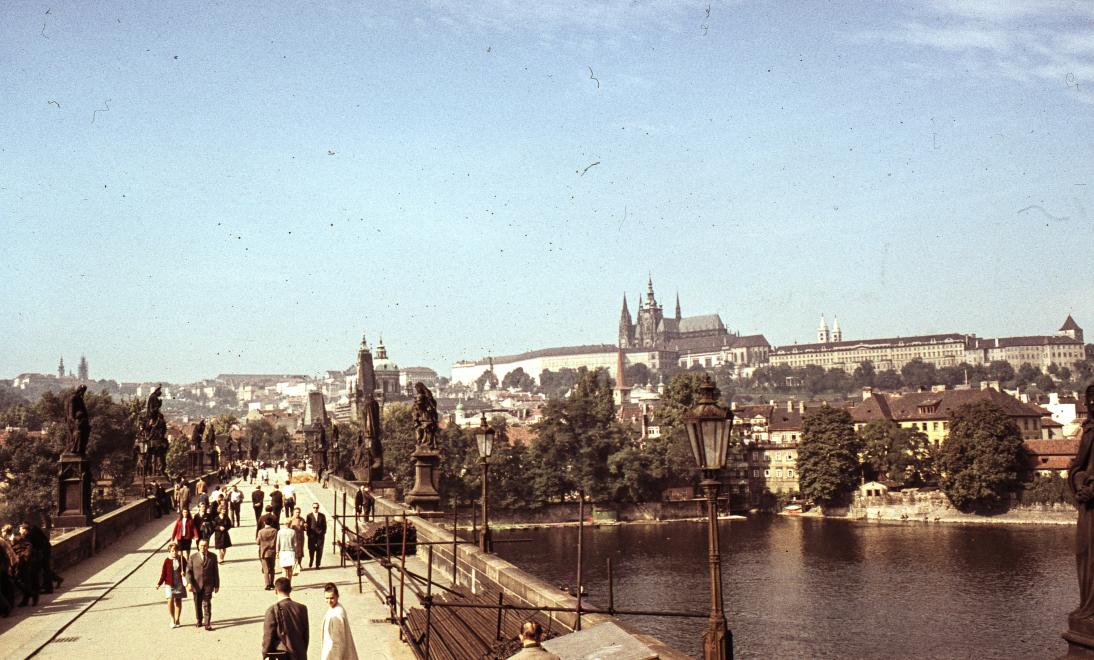In early 1968, Czechoslovakia was witnessing a process of liberalisation under the leadership of Alexander Dubček. As the newly appointed First Secretary of the Communist Party, Dubček tried to establish 'socialism with a human face' by launching a series of far-reaching reforms. This brief period of time became known as the Prague Spring and it ended with the joint military invasion of Czechoslovakia by the Soviet Union and several other Warsaw Pact states.
The opportunity for crucial change in Czechoslovakia came on 5 January 1968, when Slovak Alexander Dubček replaced the hardline Czech communist Antonin Novotný as the First Secretary of the Communist Party. Dubček was aware of the growing popular discontent in the country and acknowledged the necessity for change, albeit with the Communist Party as the main driving force behind these changes. Following Dubček's appointment, demands for reforms increased. Several pressure groups emerged within the Czechoslovak society, encompassing a series of demands, such as the rehabilitation of the previous purge victims, the abolition of censorship, economic decentralisation and the exclusion of the Communist Party from other areas outside of politics.
The first few months under Dubček's leadership did indeed bring about notable changes. Reformers gradually replaced supporters of Novotný in the state apparatus and the leading bodies of the party. Censorship became more relaxed and the national press started to attack the previous government by publishing stories of corruption concerning Novotný and other officials who were close to him.
However, the major turning point came with the launch of the Action Programme in April 1968. This political scheme was underpinned with the Dubček's vision of 'socialism with a human face', a form of socialism through which the gap between the party and society would be narrowed.
Given that the most stringent need was that of an economic reform, the plan called for a minimum intervention of the state in economic affairs. The Soviet model of centrally planned economy proved to be highly damaging for Czechoslovakia, putting a strain on both local and national initiative. Under the new scheme, the role of the government was to be limited to general economic policy and long-term planning. Both industrial enterprises and agricultural cooperatives were provided with greater freedom in finding new markets. Furthermore, full equality in economic relations was to be instituted between Czechoslovakia and the U.S.S.R.
Another crucial aspect of the Action Programme was the granting of individual rights and liberties. Complete freedom of speech, debate, association, and travel were to be established for the citizens of Czechoslovakia. At the same time, following pressure from the former political prisoners who had been wrongfully prosecuted until 1968, arbitrary arrest was forbidden, and the courts were provided with a greater authority. The Action Programme also put into question the nature of the party's leading role in Czechoslovakia. Whereas the Communist Party was still holding the reins of power in the state, it was proclaimed that the Party should be more responsive to the feelings of the society as a whole. Therefore, according to the Programme, the Party was supposed to win over the population in a genuine way, by encouraging freedom of expression and assembly.
Last but not least, a Czecho-Slovak federation was proclaimed, following complaints voiced by Slovaks that the government was ruling asymmetrically, favouring Czechs. The legislative power in Slovakia was to be held by the Slovak national council and the Slovak council of ministers became the executive authority in Bratislava. Eventually, this came to be the only measure adopted during the Prague Spring that was kept after its suppression.
The changes in Czechoslovakia were anxiously observed by the Soviet Union, but also by the other states of the Eastern bloc. Dubček had repeatedly proclaimed the country's commitment to socialism and to the Warsaw Pact, and had even gone to Moscow immediately after his appointment. But the Soviet leaders were worried that the enthusiasm generated by the reforms would push Dubček in an even more liberal direction, thus endangering the stability of the satellite bloc.
Thus, the Prague Spring was forcefully put to an end on the night of 20/21 August 1968, with the invasion by the military forces of the Soviet Union and other Eastern Bloc countries, including the German Democratic Republic, Poland, Hungary and Bulgaria. Almost all of the reforms that were established during Dubček's stay in power were eliminated, and Czechoslovakia entered a period of the so-called normalisation, which meant the return to the previous political model.
The Prague Spring is said to have inspired Mikhail Gorbachev with his reform policies of Glasnost and Perestroika. Today, together with the Hungarian Revolution of 1956 and the Solidarność movement in Poland in the 1980's, the Prague Spring is considered a key event in the history of the Eastern Bloc, which paved the way for the collapse of communist regimes in Europe.
by Cătălina Vrabie
Bibliography:
Calvocoressi, Peter, World Politics since 1945, Pearson Longman, 2008
Crampton, R.J., Eastern Europe in the Twentieth Century and After, Routledge, London and New York, 1997
Dowling, Maria, Czechoslovakia, Arnold, London, 2002
